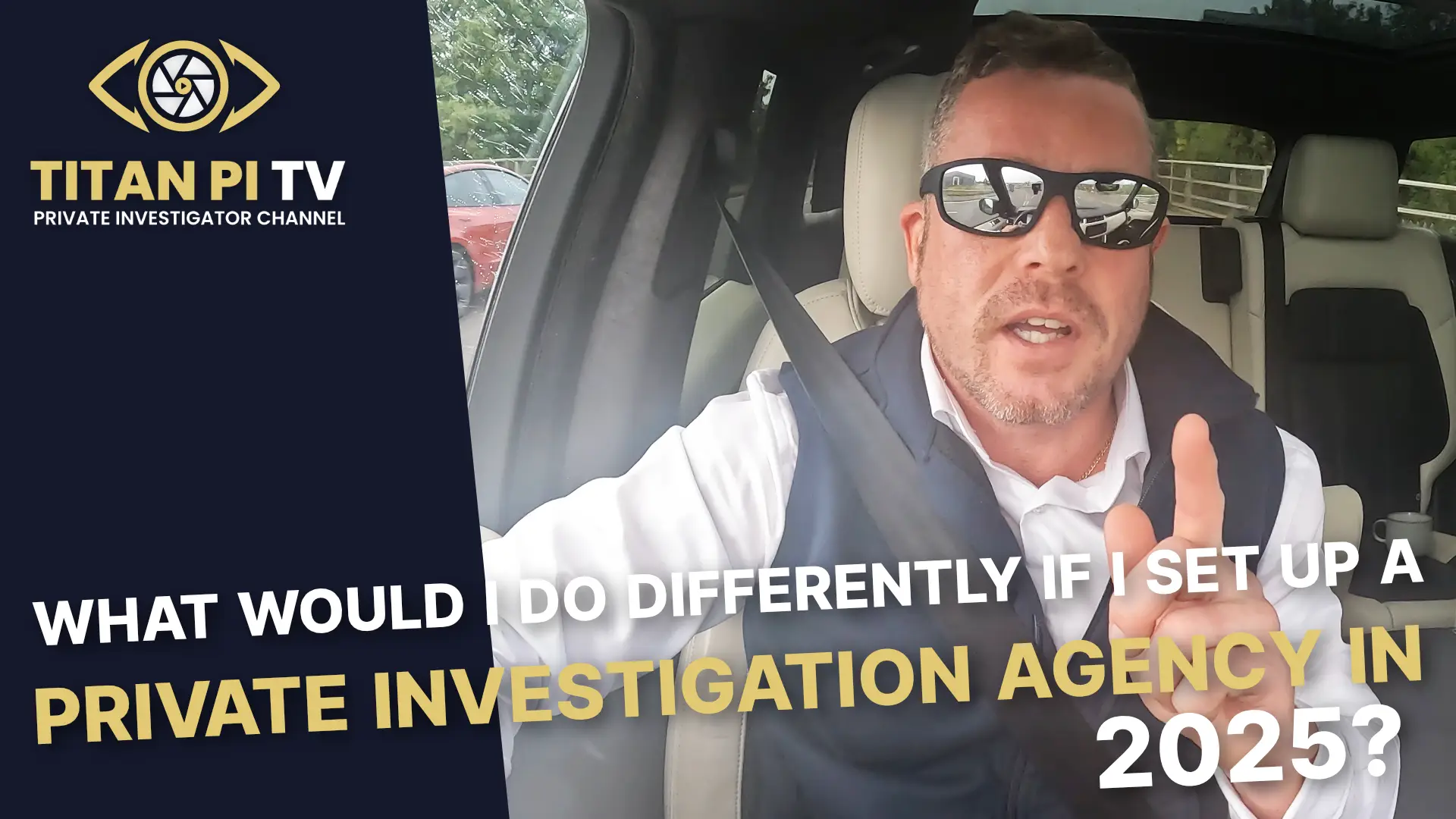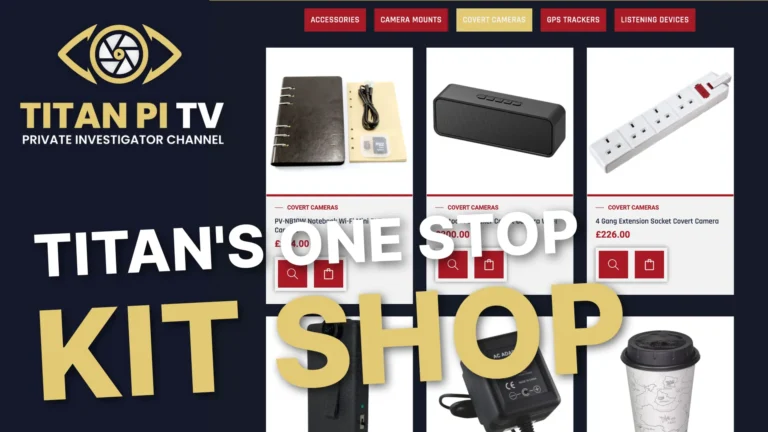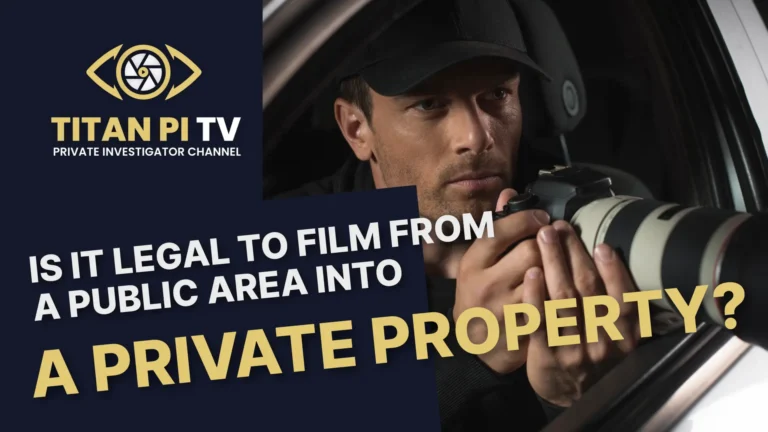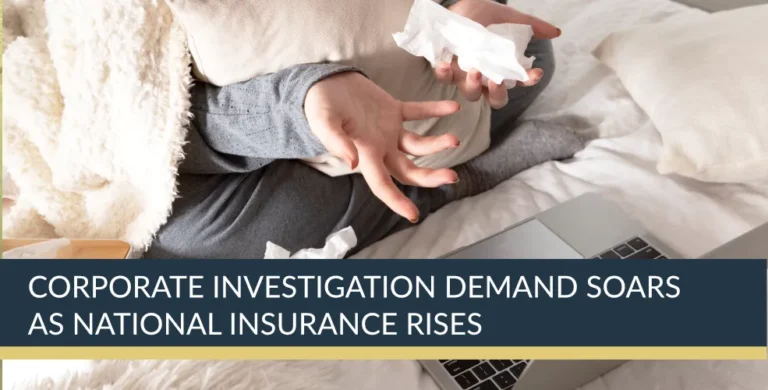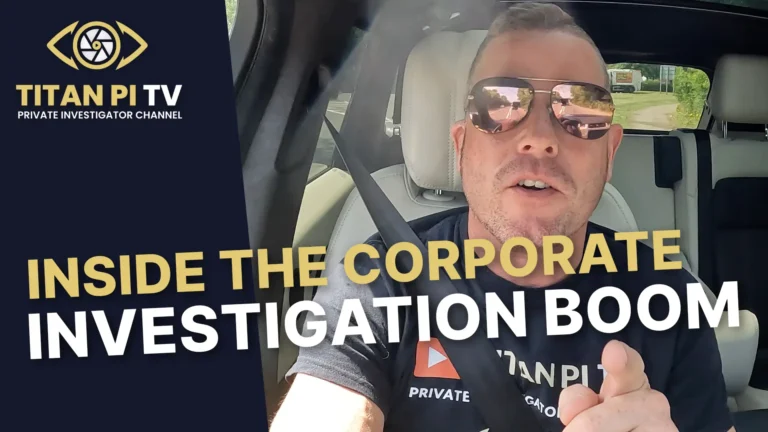What would I do differently if I set up a Private Investigation Agency in 2025?
Lessons learned with Titan Investigations’ Simon Henson
In the latest episode of Titan PI TV, host and Titan Investigations founder Simon Henson lifts the lid on the decisions he’d change—and the strategies he’d double down on—if he were launching a private investigation agency in 2025. Drawing on more than a decade of steady growth and hard-won experience since leaving the police, Henson delivers an unvarnished playbook for aspiring PIs and agency owners: no fluff, no gimmicks, just what works and what wastes money.
From the timing of leaving a public service career to the digital levers that reliably bring in quality enquiries, his advice is both candid and practical. Here are the key takeaways.
1) Timing is everything: leave earlier than you think
If he could rewind the clock, Henson’s first decisive change would be leaving the police earlier. By the seven-year mark of his service, he was already running covert investigations and managing surveillance teams as a Sergeant—skills that translate directly into the private sector. “If I had left 10 years earlier, I would be 10 years ahead of me now,” he says, noting the compounding effect of early momentum.
It’s a striking statement from someone who has achieved significant growth over the last 11 years, culminating in a nationwide footprint with 328 subcontractors delivering surveillance across the UK. The lesson isn’t about impatience; it’s about recognising when your experience and skill set are market-ready—and being bold enough to back yourself sooner. For many in policing, military or government roles, the barrier is psychological rather than practical: a perceived safety in staying put versus the opportunity cost of delaying.
Henson’s retrospective view underscores a wider truth for specialist services: time in market compounds. Experience, reputation, client relationships and operational systems all mature year-on-year. The earlier those cycles begin, the greater the competitive advantage later.
2) Don’t burn cash on PPC: invest in SEO from day one
On the marketing front, Henson’s verdict on pay-per-click advertising is unequivocal: “I would never ever do pay per click again.” He recalls a six-month campaign costing around £3,600 including VAT, which delivered the wrong kind of traffic—enquiries from people expecting free work or services outside Titan’s target profile. In his words: time-wasters.
While PPC can work in certain sectors with high-intent transactional keywords and mature bidding strategies, PI services face nuance and ambiguity that often lead to mismatched leads. If your ads are broad, you attract noise. If they’re narrow, your costs spike and volume collapses. And if an agency sets it up poorly, you pay to educate the wrong audience.
Henson’s alternative is a measured, compounding strategy: search engine optimisation. From day one, he recommends researching the right keywords for the services you actually want to deliver, and then optimising your website accordingly. This isn’t about gaming algorithms; it’s about building an authoritative, helpful resource that steadily earns rankings and trust. Crucially, he stresses that SEO doesn’t have to be expensive—what it does require is consistency.
The outcome is higher-quality inbound enquiries from prospects already aligned with your offerings—and fewer calls asking for free investigations.
3) Publish like a newsroom: fresh, relevant content weekly
Henson’s SEO approach hinges on a sustainable publishing cadence. His guidance is simple: add new, relevant content once or twice a week in the form of news posts or blogs. Search engines continuously crawl for updates, assess relevance, and index content over time; feeding them consistent, quality material signals an active, authoritative business.
What counts as “relevant”? For investigation firms, that could include:
- Practical guides for corporate clients (e.g., how HR can lawfully handle suspected misconduct or sickness absence abuse)
- Legal-adjacent explainers for solicitors (e.g., handling evidence, surveillance compliance, chain of custody)
- Case-study style overviews (sanitised for confidentiality) demonstrating investigative methodologies and outcomes
- Regional insights (e.g., local court trends, fraud patterns, industry-specific risks)
- Updates on legislation and best practice in surveillance and data handling
The point isn’t to go viral; it’s to be helpful and visible. Over time, this content builds the site’s topical authority, generates long-tail keyword rankings, and acts as a pre-sales resource for clients conducting due diligence.
4) Treat your Google Business Profile like a shop window
Henson singles out Google Business Profiles (formerly Google My Business) as a quick win. His recommendation: post photos weekly to demonstrate activity and recency. It’s a simple signal, but an effective one—especially for local visibility in maps and “near me” searches.
Alongside frequent updates, ensure your profile is fully optimised:
- Accurate NAP (name, address, phone) details matching your website
- Clear service descriptions and service areas
- Professional imagery (team, equipment, training, discreet fieldwork setups where appropriate)
- Regular posts highlighting recent articles, videos or community engagement
- Reviews from satisfied clients where permissible and appropriate, managed with discretion given the sensitive nature of investigative work
Henson notes that other search engines and directories offer similar listings; use them. While Google dominates, a diversified local presence helps discovery and reinforces legitimacy.
5) Go heavy on video—and embed it on your site
“Search engine algorithms love video,” Henson says, and he puts that into practice with weekly Titan PI TV episodes. His advice to new agencies: produce videos regularly and embed them on your website. Video can humanise technical services, answer common questions concisely, and demonstrate expertise. It also increases time-on-page—another positive signal for search engines.
For investigation firms, strong video formats include:
- Frequently asked questions (e.g., what a lawful surveillance instruction looks like)
- “Behind the methods” explainers (within operational security and legal constraints)
- Client-use-case walkthroughs for corporate, legal and private clients
- Myth-busting short clips to educate the market and set expectations
Embed every episode in a dedicated post with a transcript and summary. That multiplies your content footprint and makes your expertise discoverable across search and social channels.
6) Repurpose into podcasts: transcripts are your friend
Henson’s workflow is clean and efficient: extract a transcript from your video and repurpose it as a podcast episode. It’s a light lift that expands reach into audio platforms without doubling production time. The transcript also supports accessibility, SEO, and written content creation.
A practical rhythm might look like this:
- Record a weekly 8–15 minute video
- Publish to YouTube and embed on your site
- Generate a cleaned transcript and turn it into a blog post
- Strip the audio for a podcast feed
- Clip short segments for social media
This cadence compounds your authority in the market and reaches prospects in their preferred format—whether they watch, listen or read.
7) Drop the “smoke and mirrors”: focus on value, not vanity
Perhaps the most refreshing section of Henson’s advice is his rejection of vanity updates. Boasting about hours worked, headcount or how “busy” you are does little for clients, he argues. “No one’s bothered about how busy you are… It’s just blowing smoke up your own arse.”
He acknowledges that he’s fallen into that trap before—many businesses do—but emphasises that it adds little beyond superficial credibility. Prospects—especially corporate and legal clients—care about capability, compliance, outcomes, and professionalism. Replace chest-thumping with substance:
- Clear service scope and lawful frameworks
- Case-aligned methodologies and transparency on limitations
- Turnaround times, reporting quality and evidence standards
- Insurance, accreditations and data protection practices
- Demonstrable results (anonymised and compliant)
In an industry where trust is paramount, authenticity wins. The best marketing reads like an expert briefing, not a brag.
8) Network relentlessly—then turn conversations into relationships
“Network, network, network,” Henson insists. Despite disliking it early on—small talk, cliques, awkward rooms—he credits networking as the primary place where core clients are found: solicitors, HR leaders and consultants who influence investigative spend.
With practice, he’s become comfortable walking into any room and starting conversations with purpose. The payoff has been significant: direct instructions from law firms and HR representatives, plus referrals from smaller consultancies into larger companies.
Practical tips for PI networking in 2025:
- Choose rooms where decision-makers gather: employment law forums, HR associations, fraud roundtables, insurance groups, regional legal societies
- Lead with insight, not a sales pitch: offer a practical takeaway every time
- Follow up promptly with a short, value-led note and a relevant resource (e.g., your latest guide or case study)
- Speak when you can: panels and short talks accelerate credibility
- Be consistent: one good breakfast doesn’t build a pipeline; a quarterly calendar does
Over time, networking becomes less about events and more about a relationship portfolio. In a referrals-driven field, that’s where stability and scale live.
9) Build for steady, sustainable growth
The through-line across Henson’s playbook is sustainability. His past 11 years have seen “steady growth all the way,” culminating in a nationwide network of 328 surveillance subcontractors. That doesn’t happen via one tactic; it’s achieved through compound habits:
- Thoughtful positioning and niche clarity
- Disciplined, low-noise marketing (SEO, content, local presence)
- Regular publishing and repurposing
- No-nonsense messaging grounded in client value
- Persistent, targeted networking
- Operational scalability via trusted subcontractors and systems
For founders in 2025, the allure of quick wins—paid ads, splashy claims, short-term hacks—will remain strong. Henson’s experience argues for the opposite: build assets that mature with time and resist tactics that produce spikes but no substance.
10) A realistic blueprint for 2025
If you’re mapping your own path into the investigations sector this year, Henson’s checklist is a pragmatic starting point:
- Make the leap when your skills are market-ready. Don’t give up a decade of compounding opportunity.
- Avoid PPC unless you have airtight targeting and a proven agency. Otherwise, it’s expensive noise.
- Invest in SEO and content from day one. Aim for one to two high-quality posts per week.
- Treat your Google Business Profile as a live asset. Post weekly, keep details precise, and extend to other directories.
- Produce weekly videos and embed them on your site. Search engines and clients reward clarity and consistency.
- Repurpose content into podcasts and written posts using transcripts. Maximise output from each recording.
- Cut the vanity metrics. Replace them with proof points that matter to legal and corporate buyers.
- Network with intent. Show up where solicitors and HR decision-makers are—and bring value to every interaction.
What’s Next on Titan PI TV?
Titan PI TV continues to grow steadily, with 2,720 subscribers and counting—a testament to the appetite for straight-talking guidance in a complex field. If you found Henson’s insights useful, subscribe to the channel to catch future episodes. New content drops every Friday at 3:00 pm, offering grounded advice for investigators, agency owners and professionals who work with them.
Thank you for reading, watching, or listening to this week’s blog post on Titan PI TV. For more expert advice and behind-the-scenes insights, subscribe to Titan PI TV on YouTube or download the Titan PI TV podcast wherever you get your podcasts. If you found this information helpful, please give us a thumbs up and subscribe to our channel. Stay tuned for more insights into the world of private investigations. Until next time, stay safe and keep learning!
Titan PI TV: Uncovering the Truth, One Investigation at a Time.

